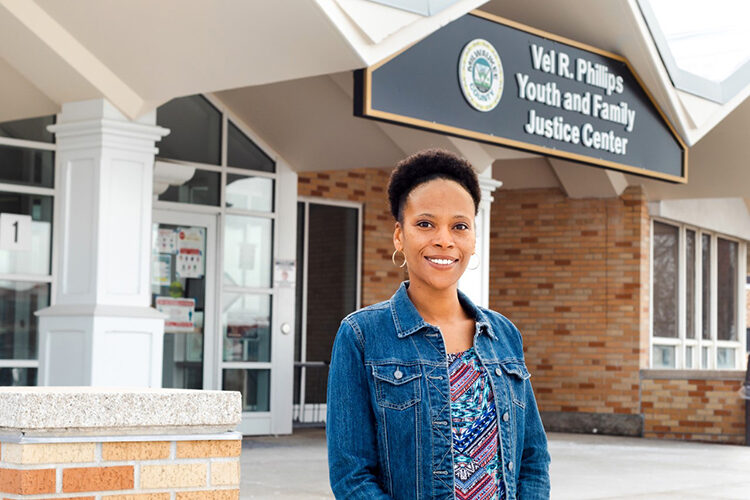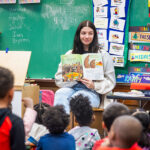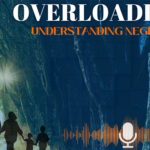Krishana Robinson’s students may be with her for a few days, a few weeks or a few months.
But however long she has them in her classroom at the Vel R. Phillips Juvenile Justice Center, she tries to leave them with a positive message about making better decisions.
She tells them: “I know you were born to be more than that.”
Robinson, who earned her bachelor’s and master’s degrees in exceptional education from UWM, started teaching for Milwaukee Public Schools in 2008. She applied for a summer job in Wauwatosa in 2017. The position was at the Vel R. Phillips Juvenile Justice Center School, which is part of the Wauwatosa School District. When the summer ended, the district asked her to stay on full-time. The school provides educational services to all Milwaukee County children who are placed in the secure detention facility.
Challenging work
The work is challenging and sometimes wears on her soul, she said, but she is committed to teaching the young people she works with both academics and socioemotional learning. “It’s not just teaching reading and writing.”
Robinson tries to connect to the common humanity they have with each other and with their victims. For example, she talked to a young man who snatched a purse from a single mother about how important the woman’s money was to her and her family.
She cares deeply about each of her students, celebrating their achievements but saddened when one of them shows up in a crime report on the evening news.
“It’s not just those who commit another crime as an adult; it’s those who are victims of crime themselves at 16.”
She remembers sitting on her porch one day when a car with some of her former students stopped by and gave a shout out to “Ms. Robinson.” A while later one of them was shot and killed in the same neighborhood. “His fate haunted me. Those type of things take an emotional toll.”
Helping students find strength
Robinson said she tries to balance those moments by trying to help each student find their strength and light. “I try to find the quality within them that helps them avoid bad decisions in the future.”
For her work, she was nominated for the 2021 Wisconsin Public Education Network Changemaker of the Year award along with 10 other educators across the state.
“She definitely always shows up with her authentic self.” said Amandla Daniels, the school’s social worker. Robinson collaborates with colleagues, and students respect her, she added. “She has a way of engaging with students. Whatever classes she teaches in, the students say she is their favorite teacher. She is able to have conversations with them that other teachers aren’t always able to have.”
For Robinson, “this is more than a job, this is a vocation,” said Matthew Byers, onsite administrator for the school. She views students through a trauma and restorative lens, he added. “She looks at and engages the whole student, including their mental and emotional aspects.”
Robinson gives credit to her colleagues at the justice center, and to her education at UWM for helping her succeed.
Education provides a path
Education was her own path out of challenging circumstances and formed her determination to become a teacher.
“The adults in my life had so many problems and were sometimes buckling under their own challenges,” Robinson said. “They didn’t worry about me too much because I was bringing home straight A’s.”
School became the place she received nurturing, guidance, encouragement and consistent meals.
“Even as a child, I knew life didn’t have to be the way it was at home or with the adults in my life. School reinforced that.”
She graduated from James Madison High School in Milwaukee as valedictorian and, with the help of supportive teachers, received a scholarship to Milwaukee School of Engineering.
High expectations needed
However, she found her education had left her less prepared than her classmates for rigorous academics of college.
“I remember in school being told to ‘do math problems one to 30, but don’t worry about the word problems.’” As a result, she said, she didn’t develop essential critical thinking skills that she needed.
“That was an injustice. I mastered everything they put in front of me. It’s such a shame they didn’t have high enough expectations.” She decided she wanted to be a public school teacher who worked with her students no matter how hard it was to teach the subject or the concept. “I decided I wouldn’t be a teacher who takes the easy route.”
Her education at UWM helped develop her classroom management skills, she said, but also prepared future teachers to recognize their own biases and understand students who come from backgrounds of poverty and racism.
“UWM did a really good job of teaching education students about cultural relevancy and cultural intelligence. Cultural relevance wasn’t secondary or an extra. It was expected to inform our teaching.”
Others struggle
When she started in MPS, Robinson said, “I saw a lot of teachers struggling because they didn’t have the really essential skills for working in urban schools with kids with all kinds of challenges.”
She remembers a number of exceptional education faculty at UWM such as Judy Winn and Alison Ford (both now retired). “They were so committed to the development of teachers who are successful with students. Our community, our children and our families need that level of investment. UWM is a model of how to prepare for the field.”
Teachers encouraged her, and that’s something Robinson and her colleagues try to bring to the children they work with. “Every child needs an adult who sees something positive in you, who calls that all out.”







